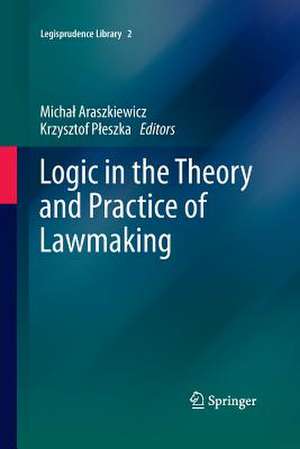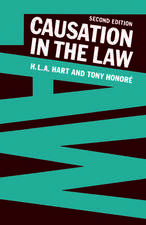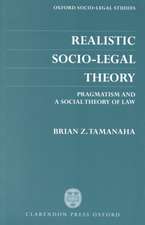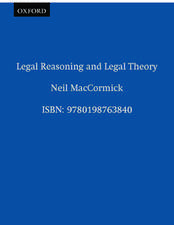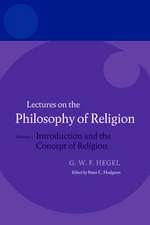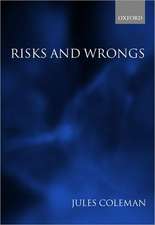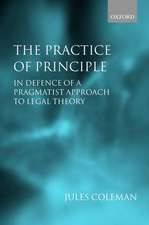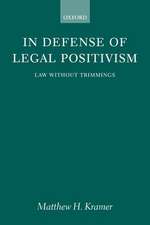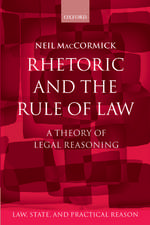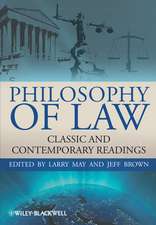Logic in the Theory and Practice of Lawmaking: Legisprudence Library, cartea 2
Editat de Michał Araszkiewicz, Krzysztof Płeszkaen Limba Engleză Paperback – 23 aug 2016
Elaborations of the process of law making have variously emphasised its political, social or economic aspects. Yet despite strong interest in logical analyses of law, questions remains about the role of logical tools in law making. This volume attempts to bridge that gap, or at least to narrow it, drawing together some important research problems—and some possible solutions—as seen through the work of leading contemporary academics.
The volume encompasses 20 chapters written by authors from 16 countries and it presents diversified views on the understanding of logic (from strict mathematical approaches to the informal, argumentative ones) and differentiated choices concerning the aspects of law making taken into account. The book presents a broad set of perspectives, insights and results into the emerging field of research devoted to the logical analysis of the area of creation of law.
How does logic inform lawmaking?
Are legal systems consistent and complete?
How can legal rules be represented by means of formal calculi and visualization techniques?
Does the structure of statutes or of legal systems resemble the structure of deductive systems?
What are the logical relations between the basic concepts of jurisprudence that constitute the system of law?
How are theories of legal interpretation relevant to the process of legislation?
How might the statutory text be analysed by means of contemporary computer programs?
These and other questions, ranging from the theoretical to the immediately practical, are addressed in this definitive collection.
| Toate formatele și edițiile | Preț | Express |
|---|---|---|
| Paperback (1) | 654.43 lei 6-8 săpt. | |
| Springer International Publishing – 23 aug 2016 | 654.43 lei 6-8 săpt. | |
| Hardback (1) | 661.02 lei 6-8 săpt. | |
| Springer International Publishing – 15 oct 2015 | 661.02 lei 6-8 săpt. |
Preț: 654.43 lei
Preț vechi: 769.92 lei
-15% Nou
Puncte Express: 982
Preț estimativ în valută:
125.24€ • 130.27$ • 103.39£
125.24€ • 130.27$ • 103.39£
Carte tipărită la comandă
Livrare economică 14-28 aprilie
Preluare comenzi: 021 569.72.76
Specificații
ISBN-13: 9783319371467
ISBN-10: 3319371460
Pagini: 556
Ilustrații: XXVI, 556 p.
Dimensiuni: 155 x 235 mm
Greutate: 0.81 kg
Ediția:Softcover reprint of the original 1st ed. 2016
Editura: Springer International Publishing
Colecția Springer
Seria Legisprudence Library
Locul publicării:Cham, Switzerland
ISBN-10: 3319371460
Pagini: 556
Ilustrații: XXVI, 556 p.
Dimensiuni: 155 x 235 mm
Greutate: 0.81 kg
Ediția:Softcover reprint of the original 1st ed. 2016
Editura: Springer International Publishing
Colecția Springer
Seria Legisprudence Library
Locul publicării:Cham, Switzerland
Cuprins
Preface.- Table of contents.- About the authors.- Part I From the Theory.- 1 The (Onto)logical Structure of Law. A Conceptual Toolkit For Legislators; Jaap Hage.- 2 Conflict of Legal Norms: Definition and Varieties; Lars Lindahl and David Reidhav.- 3 Entailed Norms and the Systematization of Law; Pablo E. Navarro and Jorge L. Rodríguez.- 4 Conservative Coherentist Closure of Legal Systems; Juliano S. A. Maranhão.- 5 Negation in Legislation; Giovanni Battista Ratti.- 6 Open Texture in Law, Legal Certainty and Logical Analysis of Natural Language; Jaromir Šavelka and Jakub Harašta.- 7 The Theories of Statutory Construction and Legislative Process in American Jurisprudence; Linda D. Jellum.- 8 Logic and the Directives of Legislative Technique. Some Logical Remarks on the Polish “Principles of Legislative Technique”; Urszula Kosieliń ska-Grabowska and Andrzej Grabowski.- 9 The Hidden Acts of Definition in Law – Statutory Definitions and Burden of Persuasion; Fabrizio Macagno and Giovanni Damele.- 10 The Concept of Normative Consequence and Legislative Discourse; Michał Araszkiewicz and Krzysztof Płeszka.- Part II to the Practice of Lawmaking.- 11 Formalising Debates about Law-making Proposals as Practical Reasoning; Henry Prakken.- 12 Logics for Legal Dynamics; Guido Governatori and Antonino Rotolo.- 13 Representing the Logic of Statutory Rules in the United States; Vern R. Walker, Bernadette C. Lopez, Matthew T. Rutchik, and Julie L. Agris.- 14 Modern Logic as a Tool for Remedying Ambiguities in Legal Documents and Analyzing the Structure of Legal Documents’ Contained Definitions; Layman E. Allen and Leon J. Lysaght, Jr..- 15 From the Language of Legislation to Executable Logic Programs; Adam Wyner.- 16 A Rule–Based Graphical Decision Charting Approach to Legal Knowledge Based System; Nitin B. Bilgi.- 17 Logic Oriented Methods for Structuring in the Context of Lawmaking; Vytautas Čyras and Friedrich Lachmayer.- 18 Creating CoReO, theComputer Assisted Copyright Reform Observatory; Ermo Täks, Addi Rull, Anni Säär, and Burkhard Schäfer.- 19 Legal Knowledge Modeling for Managing Legislation in the Semantic Web; Enrico Francesconi.- 20 Computer-aided Legislation Based on Immune-like Processing of Legal Texts; Tomasz Pełech-Pilichowski and Wojciech Cyrul.- Index.
Textul de pe ultima copertă
This book presents the current state of the art regarding the application of logical tools to the problems of theory and practice of lawmaking. It shows how contemporary logic may be useful in the analysis of legislation, legislative drafting and legal reasoning concerning different contexts of lawmaking.
Elaborations of the process of lawmaking have variously emphasised its political, social or economic aspects. Yet despite strong interest in logical analyses of law, questions remains about the role of logical tools in lawmaking. This volume attempts to bridge that gap, or at least to narrow it, drawing together some important research problems—and some possible solutions—as seen through the work of leading contemporary academics.
The volume encompasses 20 chapters written by authors from 16 countries and it presents diversified views on the understanding of logic (from strict mathematical approaches to the informal, argumentative ones) and differentiated choices concerning the aspects of lawmaking taken into account. The book presents a broad set of perspectives, insights and results into the emerging field of research devoted to the logical analysis of the area of creation of law.
How does logic inform lawmaking?
Are legal systems consistent and complete?
How can legal rules be represented by means of formal calculi and visualization techniques?
Does the structure of statutes or of legal systems resemble the structure of deductive systems?
What are the logical relations between the basic concepts of jurisprudence that constitute the system of law?
How are theories of legal interpretation relevant to the process of legislation?
How might the statutory text be analysed by means of contemporary computer programs?
These and other questions, ranging from the theoretical to the immediately practical, are addressed in this definitive collection.
Elaborations of the process of lawmaking have variously emphasised its political, social or economic aspects. Yet despite strong interest in logical analyses of law, questions remains about the role of logical tools in lawmaking. This volume attempts to bridge that gap, or at least to narrow it, drawing together some important research problems—and some possible solutions—as seen through the work of leading contemporary academics.
The volume encompasses 20 chapters written by authors from 16 countries and it presents diversified views on the understanding of logic (from strict mathematical approaches to the informal, argumentative ones) and differentiated choices concerning the aspects of lawmaking taken into account. The book presents a broad set of perspectives, insights and results into the emerging field of research devoted to the logical analysis of the area of creation of law.
How does logic inform lawmaking?
Are legal systems consistent and complete?
How can legal rules be represented by means of formal calculi and visualization techniques?
Does the structure of statutes or of legal systems resemble the structure of deductive systems?
What are the logical relations between the basic concepts of jurisprudence that constitute the system of law?
How are theories of legal interpretation relevant to the process of legislation?
How might the statutory text be analysed by means of contemporary computer programs?
These and other questions, ranging from the theoretical to the immediately practical, are addressed in this definitive collection.
Caracteristici
Emphasizes the practical, supported by legal-philosophical analyses A thorough treatise presenting contemporary state of art as regards the application of logic to the problems of legislation Written by logicians, legal philosophers and AI and Law specialists Provides valuable insights for researchers and legislative drafters
